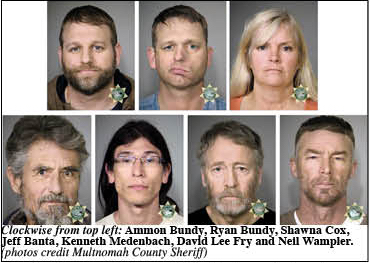
Armed antigovernment protesters led by Ammon and Ryan Bundy were acquitted Thursday of federal conspiracy and weapons charges stemming from the takeover of a federally owned wildlife sanctuary in Oregon last winter.

The surprise acquittals of all seven defendants in Federal District Court were a blow to government prosecutors, who had argued that the Bundys and five of their followers used force and threats of violence to occupy the reserve. But the jury appeared swayed by the defendants’ contention that they were protesting government overreach and posed no threat to the public.
In a sign of the tension that ran through the trial, Ammon Bundy’s lawyer, Marcus R. Mumford, frustrated that the Bundys were not being released, was restrained by four United States marshals after an outburst.
“I knew that what my husband was doing was right, but I was nervous because the judge was controlling the narrative,” said Ryan Bundy’s wife, Angela Bundy, 39, in a telephone interview from the family ranch in Bunkerville, Nev. “But they saw the truth. I am just so grateful they saw it.”

It was not immediately clear how the not-guilty verdicts would affect the government’s strategy in another case stemming from the Oregon occupation, or a trial in Nevada that the Bundy brothers and their father, Cliven Bundy, face for an armed standoff there.
The Oregon occupation, at a remote and frigid reserve in the southeastern part of the state, was rooted in antigovernment fervor and captured the nation’s attention. It had a Wild West quality, with armed men in cowboy hats taking on federal agents in a tussle over public lands and putting out a call for aid, only to see their insurrection fizzle.
 In a monthlong trial here, the defendants never denied that they had occupied and held the Malheur National Wildlife Refuge headquarters for nearly six weeks, demanding that the federal government surrender the 188,000-acre property to local control. But their lawyers argued that prosecutors did not prove that the group had engaged in an illegal conspiracy that kept federal workers — employees of the Fish and Wildlife Service and the Bureau of Land Management — from doing their jobs.
In a monthlong trial here, the defendants never denied that they had occupied and held the Malheur National Wildlife Refuge headquarters for nearly six weeks, demanding that the federal government surrender the 188,000-acre property to local control. But their lawyers argued that prosecutors did not prove that the group had engaged in an illegal conspiracy that kept federal workers — employees of the Fish and Wildlife Service and the Bureau of Land Management — from doing their jobs.
Eleven people had already pleaded guilty. One participant, LaVoy Finicum, was killed by the authorities during the standoff.
Ethan D. Knight, an assistant United States attorney, argued that the case was simple: Ammon Bundy had been selective in deciding which laws applied to him and had led an armed seizure of property that did not belong to him.

Mr. Mumford said acquitting Mr. Bundy would be a victory for all Americans. “They’re deceiving you,” Mr. Mumford said, gesturing to the prosecutors. “It’s the government that picks and chooses the rules it’s going to comply with.”
Ammon Bundy, 41, a business owner, testified for three days in his defense. He argued that the takeover was spontaneous and informed by religious belief. But prosecutors, through witnesses and their final arguments, said the group had used the threat of force and violence, crystallized by Mr. Bundy’s call for followers across the nation to come to the refuge with guns.
All seven defendants in the case were charged with conspiracy to impede federal employees from discharging their duties, and they also faced federal weapons charges and could have been given long prison sentences. The unanimous acquittals covered all the charges but one, a theft of government property charge against Ryan Bundy for removing cameras mounted at the refuge, with no verdict rendered on it.

In a statement, Oregon’s governor, Kate Brown, said she was disappointed.
“The occupation of the Malheur Reserve did not reflect the Oregon way of respectfully working together to resolve differences,” the governor said.
